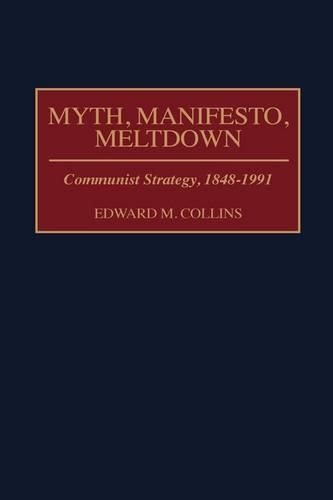
Myth, Manifesto, Meltdown: Communist Strategy, 1848-1991
(Hardback)
Publishing Details
Myth, Manifesto, Meltdown: Communist Strategy, 1848-1991
By (Author) Edward M. Collins
Bloomsbury Publishing PLC
Praeger Publishers Inc
21st January 1998
United States
Classifications
Tertiary Education
Non Fiction
Far-left political ideologies and movements
International relations
320.53209
Physical Properties
Hardback
256
Description
Collins traces Communist strategy in the so-called Cold War from its ideological roots, through its successes, to the system's collapse. He demonstrates that Communist ideology made the Cold War inevitable, shaped Communist strategy and the resultant structure and purpose of Communist states, and assured that Soviet and other Communist states and party strategies would be subsets of a larger Communist world strategy. Collins challenges American perception and conduct of the Cold War as essentially a conflict between Great Powers in a bipolar world, demonstrating that it was in fact a real war, with its objective to create a Communist world. He illuminates the central role of internal strategy conflicts in fractionating the Communist world, and the direct linkage between the failure of Communist world strategy and the system's collapse. This is a major synthesis that will be of interest to scholars and researchers of international Communism and security issues as well as lay readers.
Reviews
"With this intriguing title, Edward Collins, a former Deputy Director of the Defense Intelligence Agency, sets the stage for his thoughtful and well-researched evaluation of what made the Soviet leadership tick....[T]his is a worthwhile book. Collin's well-written account provides a coherent conception of conflict within the central planning cells of the CPSU. The author synthesizes the various periods of Soviet history admirably, while demonstrating the relevenace of this discussion to the modern world."-Parameters
With this intriguing title, Edward Collins, a former Deputy Director of the Defense Intelligence Agency, sets the stage for his thoughtful and well-researched evaluation of what made the Soviet leadership tick....[T]his is a worthwhile book. Collin's well-written account provides a coherent conception of conflict within the central planning cells of the CPSU. The author synthesizes the various periods of Soviet history admirably, while demonstrating the relevenace of this discussion to the modern world.-Parameters
Author Bio
EDWARD M. COLLINS is former Deputy Director for Foreign Intelligence, Defense Intelligence Agency. His interest in strategy and decisionmaking arose during World War II service as a combat pilot and squadron leader, and continued in subsequent operational and military intelligence assignments and academic work.
